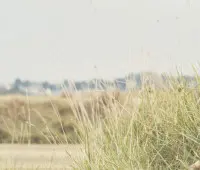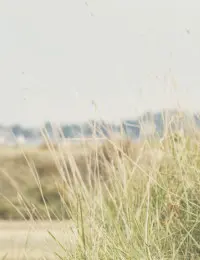
Mickaël
Salt worker in Guérande
A seasonal salt worker job that turned into the passion of a lifetime
Complete freedom is something I really value: being my own boss, having no employees...These precious advantages exist in very few professio
A seasonal salt worker job that turned into the passion of a lifetime
A native of the Guérande region, Mickaël, 42, has been a salt worker and member of the cooperative since 2016, after working in the marshes as a seasonal worker for years.
“Complete freedom is something I really value: being my own boss, having no employees... These precious advantages exist in very few professions.”
Mickaël, you wanted to become a social worker for children with special needs, but the passion for salt marshes never left you, did it?
I’m from the Guérande region originally, but I started as a seasonal worker in the marshes. I would go back to work there regularly during my studies, as a summer job, and later on, when I was out of a job. After I became a social worker for children with special needs, I soon realized that the job wasn’t what I had envisioned, so I started to think about a career and a sector where I’d feel fulfilled and happy.
Salt working appeared as an obvious choice, and I decided to retrain to work in the marshes full-time. At that time, I really found out about the realities of the job, as I only knew about the seasonal part. I worked all year long alongside other salt workers, and from there, I took the plunge.
What are the things you love about your job?
First, the setting is absolutely spectacular. And freedom is also something I really value: being my own boss, having no employees... These precious advantages exist in very few professions. I also love the not-quite-scientific, almost empirical side of the job, where you experiment with the techniques. And every year, you adapt to current situations and conditions to try out new ones.
The salt worker's job also has a surprising side: century-old traditions mixed with constant experimentations. Every year, we salt workers repeat the same gestures, and yet every year is different, because only the weather will decide what the next day will be made of.
Although I’ve always loved nature from a young age, my job as a salt worker has really helped me become more aware of the fragility of the environment. I've been a first-hand witness to how quickly it degrades. Now, I can actively take part in its preservation.
Does the job change a lot from one season to the next?
In the marshes, summer is the most important period as it's the salt production time. The setup of the marsh, which runs from mid-January to mid-November, is very important to achieve good salt production in summer. In the depths of winter, the marsh is drowned and covered with water to protect the soil from erosion. From spring to summer, the weather and evaporation accelerate, requiring more and more work, until the harvest season. Each saltworks is unique and requires a different work rhythm.
How does being grouped as a cooperative help run your business?
We are around 220 salt workers in the cooperative, but the job is quite lonely on a daily basis. Team spirit and mutual aid hold a very important place in the salt worker's profession, both socially and practically: we get together as a team with other salt workers to do big jobs that we couldn't do on our own, particularly during periods of maintenance before summertime.
As a general rule, a salt worker joins a team through his or her training master, which is how teams are perpetuated. Working with seasonal workers is also very important during the harvest periods, to carry the coarse salt back to the storage platform, but also to pick the salt flower. Picking and sorting the salt flower is a very time-consuming process and it’s impossible to do alone. Some salt growers do part of the work, while others delegate this task completely to seasonal workers.
Since I started running my business, I've been delegating the harvesting work to seasonal workers so that I can concentrate on the tasks I've kept for myself, such as collecting coarse salt. The task distribution can evolve, and that's also what I like about my job, nothing is ever set in stone.
“Being a salt worker requires a real presence on site. Young people: take advantage of your youth to travel the world. And if you still want to become a salt worker when you get back, go for it!”



Meet our other salt workers
Diverse in age and profile, Guérande's salt workers are bound together by tradition and their love of the Guérande marshes.


